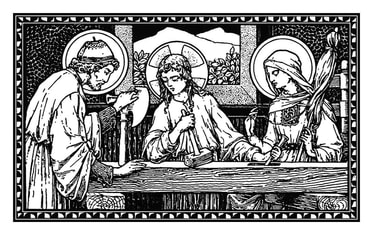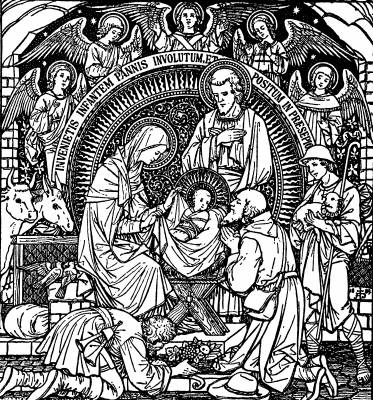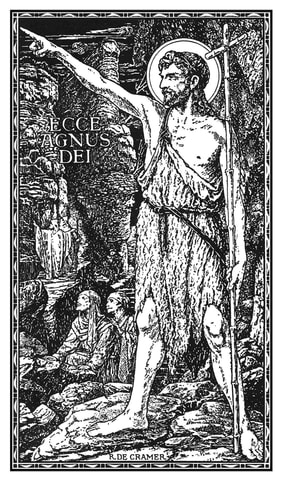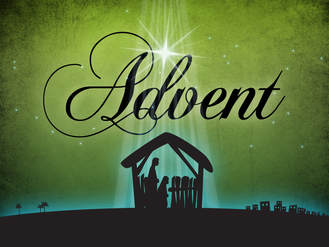 Luke 2:22, 39-40 ‘The child grew to maturity, and he was filled with wisdom; and God’s favour was with him’ (Luke 2:40) I chose to read the shortened version of our gospel this morning for two reasons; first we are going to encounter this passage again in a few weeks’ time at Candlemas, and secondly, the main point Luke wants to make this morning is that Jesus, the eternal Son of God the Father, grew up and was formed in a human family – that Holy Family. Today’s celebration can teach us something about our faith. Falling on the Sunday in the Octave of Christmas, the Feast of the Holy Family is a natural extension of Christmas Day itself, the next step in unfolding the mystery of the Incarnation. God the Son chose to become “God-with-us”, he chose to become incarnate in Mary, he chose to be born in humble conditions; then he also chose to grow up as children do within the ordinariness of a human family. In this Holy Family, God humbled himself to learn obedience to earthly parents and how to relate to other people. Why? In his loving purpose to redeem us in Jesus Christ, God assumed our flesh, our nature, and all the triviality of our being human; so he assumed also the tricky dynamics of human relationships, including family life. So in honouring the Holy Family we see how Jesus redeemed everything about our lives, even our sometimes dysfunctional families, showing us a better way, a holy way, to be family… A better way to be family… These are loaded words. I understand it. And on this feast there is always a strong danger for preachers to hold up the Family of Nazareth as the divine blue print for the ideal set up of a Christian family – mummy and daddy are happily married, and their child is so adorably well-behaved that even a carol sings “no crying he makes”. I say a danger because a family so idealized could be a stumbling block for many of us, rather than an inspiration. Besides, in practice families don’t always work like that, and our domestic arrangements are, more often than not, rather more complicated that the ones faced by the Holy Family, even with all their travels as refugees, and their having to lodge in a stable – mummy and daddy are not necessarily happily married, or together at all, and sometimes the children can be a bit of a handful to say the least. So, what would the Feast of Holy Family teach us, teach our families, today? Rather than a blue print for our domestic set up they can become a spiritual model for our families in the sense that in the home of Nazareth we see an “authentic school of the Gospel” (JPII & Francis, Angelus Messages on 30 Dec 2001 & 27 Dec 2015), where Mary and Joseph, gathered around the living Word of God, lead their household in a way that is intentionally centred on faith and commitment to God. We must look beyond the very unique features of the Holy Family’s domestic arrangements to see how Jesus, Mary, and Joseph can teach every home to be or become a “domestic church” (Lumen Gentium)– a community where the Christian habits of love, faith, and hope are practiced and taught; a haven of unconditional affection, a place where – as the introduction to the wedding service says – ‘each member, in good times and in bad, can find strength, companionship and comfort, and grow to maturity in love.’ May the prayers of the Holy Family help us to put God at centre of our homes, and gain for us the grace we need to imitate their devotion to one another in our relationships. Amen.
0 Comments
 Luke 2:1-14 ‘I am bringing you good news of great joy for all the people: to you is born this day a Saviour, who is the Christ, the Lord.’ (Luke 2:10-11) Earlier this week a BBC programme claimed that up to 25% of people who wouldn’t normally class themselves as religious believe in angels. So, it seems that even in our post-Christian, secular society many people still retain something of the time-honoured belief about these heavenly creatures. And the Christmas story we come to celebrate tonight is full of them. Reading first couple of chapters of Luke’s gospel we encounter angels everywhere – speaking, singing, catching people by surprise in the ordinariness of their lives, and bringing to them messages from God. They pave the way, as it were, for the Christmas story to unfold; as if directing a large theatre production, the divine drama of the Incarnation, they invite each character to play their part… They speak to the Virgin Mary, they speak to Joseph, at the beginning of the book they even speak to Zachariah about the birth of John the Baptist, and tonight they speak to us… ‘I am bringing you good news of great joy’, says the angel; and confronted by these news, what should our response be? If anything, 2017 has been the year of “Fake News”; at best these have been stories where the truth was side-lined in order to read as sensational headlines, and at their worst fake news have been clever pieces published to deceive or gain some dishonest advantage. So, when we hear again a two-thousand year old Bible story about heavenly creatures delivering incredible news, a few people, now perhaps more than ever before, may quite reasonably remain a little sceptic. But unseen, unheard, the angels speak to us tonight – the words of the gospel reading and the verses of our Christmas carols re-echo for us the first song they sang to the shepherds about the birth of Jesus Christ. Unseen, unheard, the angels speak to us in this place, and they bring us messages from God, true news about a child born for us. Unseen, unheard, the angels come to worship with us that child who is their King. The Bible story speaks of shepherds living in the fields; people with whom we have probably little in common. But we have already travelled in the cold winter air, like the shepherds did, to worship the Christ-child. And the angels’ message for us is about another journey that lies before us; to travel yet further to a spiritual Bethlehem, to travel with our hearts to Jesus, to see him with in humble condition in which he was born for us, and to invite him to enter our lives – tonight – that he might live with us, and us for him. ‘I am bringing you good news of great joy for all the people: to you is born this day a Saviour, who is the Christ, the Lord.’ Whether we remain sceptic about angels, or we take all news with a large pinch of salt, the good news proclaimed tonight remains; our salvation, our peace, our future lies wrapped in cloths in a stable, where God himself has come to be one of us. Like the shepherds, it is up to you to reach out to meet him.  John 1:6-8, 19-28 ‘He came as a witness to speak for the light’ (John 1:7) Yesterday afternoon we celebrated the first of our Christingles; earlier this morning we have lit the third candle on the Advent Wreath; and tonight we will come together for our service of Carols by Candlelight. All these liturgies place a very strong emphasis on the belief that Jesus is the Light of the World – a light which darkness cannot overcome (Cf. John 1:5). And as with our candles (in our hands, on top of our oranges, or on the Advent Wreath) we scatter the darkness that surrounds us, we remind ourselves and the world that only through the Light of Christ we are able to see clearly. These candles – whether wonky, propped up with tin foil, or blessed – are only a token witness to that bright, unquenchable, searing, and cheerful light that is Christ. And today’s gospel presents us with an even better example of what it means to be a witness to Jesus as the Light of the World. St John the Baptist was unquestionably a peculiar figure by any standard. As we heard last week, he wore clothes made of camel’s hair, he fed on insects and wild honey, he was often rather forthright in his speech, and although he lived in the desert he attracted a huge number of people who wanted to be baptised by him. But, what we should find even more remarkable is the way in which we are introduced to him by John the Evangelist. A man came, sent by God. His name was John. He came as a witness, as a witness to speak for the light, so that everyone might believe through him. This description of John the Baptist is an integral part of the gospel’s first few verses where Jesus is proclaimed as the Word of God, the Light of Life, and the Light of the World. And John’s ministry – in fact his whole life – was so intertwined with Jesus’ that the evangelist has to specify that John the Baptist ‘was not the light, only a witness to speak for the light’ (John 1:8). Like Moses, Isaiah, and the other prophets, John was sent by God to point the way to the Messiah, and to bring a testimony about the true Light which was about to be revealed to the world in the person of the Lord Jesus. But, as the last of the prophets, as a cousin of Jesus, and as a peculiar figure, it would be easy to look past John the Baptist and to think that he had nothing to teach us. Yet, I strongly believe that this short description of John could and should be a fitting description for every Christian – if we only let our lives become so intertwined with the life of Jesus that others would find it difficult to separate our character from his. A man came, sent by God. His name was John. He came as a witness, as a witness to speak for the light, so that everyone might believe through him. Like our candles we might be a bit wonky in our religious life (maybe not propped up with tin foil and stuck in an orange), but we are all, every one of us, most certainly blessed, and so like our candles we have to bear witness to Jesus as the Light of the World. Then, how good it would be if people were to say of us, “There was a man (or woman) sent by God. His name was … He came as a witness, as a witness to speak for the light, so that everyone might believe through him”? How good would it be, if with our simple faith we could bring the light of Jesus to others, so that those around us might have faith through us? John the Baptist led a rather odd life, but we do not need to move to the wilderness, and star eating insects, to bear witness to the Light of Jesus. We just have to put into practice the simple advice found in our second reading; ‘Be happy at all times; pray constantly; and for all things give thanks to God’ (1Thess 5:16). Our society, perhaps now more than ever, needs happy and positive people whose joy comes from knowing Christ; it needs people who take prayer and the sacraments seriously; and it needs people who know how to be grateful to God for the innumerable blessings we receive from his hand… If we do this, we will be not only genuine Christians, but we will set the world alight with the true Light that is Christ the Lord.  Mark 13:33-37 ‘What I say to you I say to all: Stay awake!’ (Mark 13:37) In our society New Years’ celebrations are usually quite cheerful affairs, sometimes featuring a staggering amount of food, drink, and fireworks; all of this in order to break as much as possible with the old, and usher in the new. And once the partying ceases, we make improbable New Year resolutions wishing to become that new person who is as different as possible from our old self. Then, perhaps, we might find it odd that the new Christian year opens by repeating the gospel message we have been hearing for some time now. Last week the Feast of Christ the King brought the Sunday cycle of the Christian year to an end with the reminder of Jesus sure return as Lord and Judge of all creation. But as today we officially begin a new liturgical year, Mark’ short parable – about the man travelling abroad who leaves his servants in charge of his household – takes us back, not only to last week, but also to a number of other parables we have read recently. And it’s meaning, like that of all those previous parables, is quite clear; when we will find ourselves face to face with Jesus, he will judge each one of us according to our deeds; according to our trustworthiness and commitment to him. But, perhaps, we may find it even more surprising that the new Christian year should open with sombre notes and reduced singing, rather than with a loud bang and cheerful noise. In this, Advent looks a little bit like Lent. Both Advent and Lent are marked by a pressing call to prepare ourselves for that which it to come. Both of these seasons are defined by the colour purple (or violet), the colour of penitence, introspection, and repentance; and the singing of the Gloria, like the flowers that usually adorn our church get put away. So much for New Year cheerfulness! Even the Scripture readings set before us are geared up, not so much towards the joy of Christmas, but rather towards the more sobering thought of being confronted by our faults. This morning the prophet Isaiah holds up a mirror to us all, and gives us a talking to, as it were. ‘We were all like unclean people, - all that integrity of ours like filthy clothing. We have all withered like leaves and our sins, like the wind, have carried us away.’ (Isaiah 64:6) And Jesus then says, ‘What I say to you I say to all: Stay awake!’ (Mark 13:37) This combined message is simple enough and yet difficult to hear at a time when we are all so busy with shopping, parties, and making everything just perfect in time for Christmas. Nevertheless, Advent calls us to assess candidly the state of our society so that we might wake up from injustice, consumerism, and selfish behaviours to prepare our world for the coming of Jesus, and so be found ready to meet him when he will come to us as our judge. We must stay awake in a spiritual sense, so that through prayer and good works, we may be prevented from sleepwalking into the hidden snares of vice. The collect from the BCP for this season helps us to put the Advent message into prayer… Almighty God, give us grace to cast away the works of darkness and to put on the armour of light, now in the time of this mortal life, in which your Son Jesus Christ came to us in great humility; that on the last day, when he shall come again in his glorious majesty to judge the living and the dead, we may rise to the life immortal; through him who is alive and reigns with you, in the unity of the Holy Spirit, one God, now and for ever. Amen. |
Archives
June 2020
Categories
All
|
 RSS Feed
RSS Feed


